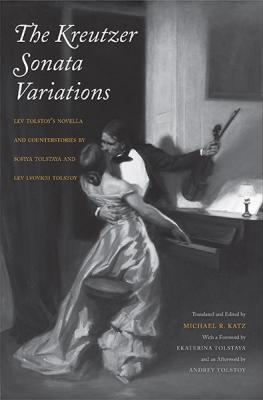Book: Tolstoy's wife has her say

ROME -- In Leo Tolstoy’s novella The Kreutzer Sonata (1889), a landowner on a train expresses his disgust of sex, women and marriage, and in a virtual monologue tells a fellow passenger how, suspecting his wife of infidelity with a visiting violinist, he had stabbed her to death. At his murder trial he was acquitted on the grounds that it was a crime of passion. The story is a harangue: the landowner, as haunted as the Ancient Mariner, must expound his extreme ideas on sex and marriage which led to his act but also requests forgiveness.
Initially the novella was banned in Russia but circulated clandestinely. The spirited response of his wife Sofiya, in two longer novellas included here, was not published in Russia until 2000.
Sofiya felt that Leo’s novella had destroyed the last vestiges of their love because it was taken as a faithful portrait of their marriage. She swore she had never been unfaithful. Complaining that it humiliated her and was ‘untrue in everything relating to a young girl’s experience,’ she wrote her side of the story. But her family and friends advised against publication and the novellas vanished into her archives. In The Kreutzer Sonata Variations all three novellas appear together for the first time, translated and annotated by Michael R Katz, a retired American professor of Russian Studies.
A lot has been written about the Tolstoys and much of it presents Sofiya as a shrew, unworthy of a genius and incapable of understanding his prophetic ideas. But her Diaries won her the sympathy of such feminists as Simone de Beauvoir and Doris Lessing. The new material strengthens the case of those who see her as an intelligent, much-put-upon woman and an interesting writer.
It makes one sorry that more writers’ wives have not used fiction to tell their side of such a story: for instance Nora Joyce getting her own back for Molly Bloom rather than confining herself to ‘You can’t imagine what it’s been like living with this man’.
Sofiya was well equipped for the task. The daughter of a physician, she was a pioneer photographer, fond of philosophy and had a long-running masterclass in writing, having transcribed such works as War and Peace.
In both her novellas, the husband is blind to the emotional and spiritual needs of his wife. In Whose Fault?, written between 1891 and 1894, the ‘strikingly attractive’ Sofiya-figure falls in love with a friend of her husband who returns from years abroad and satisfies some of her emotional needs, well short of adultery; in the second, Song Without Words, written in 1898, a more in-depth Sofiya- figure falls harder for a pianist at a neighbouring dacha. She seems willing to go the whole way but he is more interested in young men, and she consigns herself to a mental asylum.
Count Tolstoy described himself as ‘old and toothless fool ’ when he married Sofiya in 1862. He was 34 and Sofiya 18. He had been a military officer and a womaniser and warned his virgin bride by giving her his diaries to read. They recounted with brutal frankness his sexual exploits, including his having fathered a child on one of his serfs.
Sofiya admired the insight into female psychology in Anna Karenina but was dismayed that its author ‘never considered that she (Sofiya) might think and feel.’ For him sexuality was only a physical urge and, challenged to explain The Kreutzer Sonata, he wrote an epilogue in which this father of 13 (legitimate) children told mankind to abstain from sex.
Sofiya claimed she persuaded Leo to show the Kreutzer Sonata husband was mistaken to think his wife had betrayed him. Unless this had been done, the plot was lame. However, if Sofia did persuade him, it disproves her claim that he was not interested in what she thought. And the affection of some of the children for him belies her complaint that he was totally uninterested in them.
Leo and Sofiya had much in common: both were possessive of each other, both were proud and physically strong but swift to flare up. Sofia was the more practical and emotionally vulnerable. Now at long last she has had her say about how they managed to be so unhappy in their own way. While his novella is claustrophobic, her two transport us to where so much of Russian literature takes place: a summer dacha. They point to a side of the real Leo only she knew, a force she had the strength to respond to while standing her ground.
The Kreutzer Sonata Variations
Translated and Edited by Michael R.Katz
Yale University Press 356 pp


